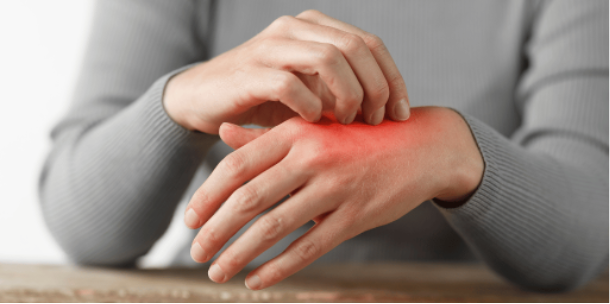Ringworm: Symptoms and Treatment
- Category: General
- Posted On:

Fungal skin infections, like ringworm, can affect several body parts. Fungi living on the skin, in hair and under nails often lead to ringworm infections. The fungi, known as dermatophytes, thrive in moist, warm conditions.
Symptoms of Ringworm
The most recognizable symptom of ringworm is a ring-shaped, itchy rash with clearer skin in the middle. Ringworm infections often present as athlete’s foot or jock itch, and can also affect the scalp, trunk, buttocks, arms and legs.
Sometimes the circular rashes expand to cover other parts of the body and they may begin to overlap. Ringworm of the scalp may lead to dry, cracked skin and hair loss.
Ringworm Causes
Ringworm is contagious and spreads through close contact with an infected person or animal. Ringworm spreads even faster in areas with contaminated surfaces like gyms and locker rooms.
Other ringworm causes include sharing objects or coming into contact with contaminated soil.

Diagnosing Ringworm
If a person suspects they have a ringworm infection, they should seek medical treatment. The doctor will assess the affected skin to check for tell-tale ring-shaped rashes. Not everyone with a ringworm infection will have a rash. Even if they do, it may resemble other skin infections, so the doctor may perform several tests to confirm the diagnosis.
These tests entail skin scraping, nail clipping and getting hair samples. The doctor will prepare them with a KOH (potassium hydroxide) solution and view them under a microscope to determine the presence of dermatophytes.
If the KOH produces an inconclusive result, the doctor will take another scraping or sample and send it to a laboratory for incubation. This test takes weeks to produce results, but it can identify the specific strain of fungi causing the patient’s symptoms.
Ringworm Treatment
Some people experience recurring ringworm infections and choose to treat the rashes with home remedies. These remedies include essential oils, apple cider vinegar, tea tree oil and aloe vera.
It is essential to consult a doctor if ringworm symptoms don’t clear up within two weeks of applying home remedies because the infection is highly contagious.
Medical ringworm treatment includes antifungal ointment and oral medication. When applying a topical treatment, the patient should not bandage the affected skin as this will slow the healing process. Ringworm of the scalp often only responds to oral medication, but an antifungal shampoo may help reduce itching and boils.
During treatment, bedding, underwear, socks and other clothing that comes into contact with the affected skin should be washed in hot water daily.
How to Prevent Ringworm
Preventing ringworm isn’t always easy, but it is best to:
- Change underwear and socks often.
- Clean high-use surfaces regularly.
- Keep fingernails and toenails clean and short.
- Keep skin clean and dry by wearing light clothing and breathable shoes.
- Wash hands after petting a cat or dog.
- Wear flip-flops in locker rooms and public showers or gyms.

Visit UF Health Emergency & Urgent Care Center for Ringworm Treatment
At UF Health Emergency & Urgent Care Centers, our primary goal is to provide the residents of Northeast Florida with exceptional service and the proper billing for the care they need. Our combined emergency room and urgent care is fully equipped to handle everything from allergies and fractures to chest pain, with on-site labs, X-ray, ultrasound and CT, all under one roof.
The ER and urgent care centers are open 24 hours a day, 7 days a week. No appointment is necessary — just walk in!
Find the UF Health Emergency & Urgent Care Center in Jacksonville nearest you at www.euc.ufhealthjax.org/locations.
